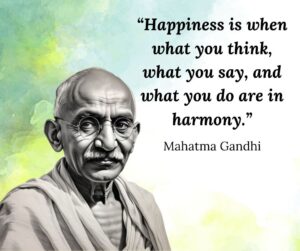Mahatma Gandhi’s quote, “Happiness is when what you think, what you say, and what you do are in harmony,” is a timeless message about alignment and integrity. Through these words, Gandhi provides us with a roadmap for authentic happiness, grounded not in fleeting moments but in a sustained sense of purpose, truth, and inner balance. In today’s fast-paced world, where distractions abound and stress levels are high, this insight is particularly relevant. Let’s explore the profound wisdom behind Gandhi’s idea and how we can apply it in our lives to find true happiness.
The Meaning of Harmony
Gandhi’s definition of happiness goes beyond the typical association of joy with external success or temporary pleasure. Harmony, as Gandhi suggests, is about alignment between one’s internal world and external actions. When our thoughts, words, and deeds are congruent, we create a life that feels genuine and fulfilling, unburdened by inner conflict or regret.
To truly grasp this harmony, it’s helpful to examine each component:
- Thoughts – The mental space where values, beliefs, and dreams reside.
- Words – How we express those inner beliefs and aspirations to the world.
- Actions – The manifestation of thoughts and words through our deeds.
When there’s a gap between these areas, it can lead to inner turmoil, confusion, and unhappiness. But when they align, we feel a deep sense of satisfaction and purpose.
Why Misalignment Causes Unhappiness
Misalignment often leads to unhappiness because it creates internal conflict. For example, imagine someone who values kindness but frequently finds themselves speaking harshly or acting out of anger. The inconsistency between their values and their behavior can lead to self-doubt, guilt, and frustration. Over time, this disconnect wears on their spirit, creating feelings of dissatisfaction and unfulfillment.
This inner discord is common in a world where people are often pressured to prioritize status, material gains, or social approval over their core values. Gandhi reminds us that happiness isn’t found by satisfying societal expectations but by finding coherence within ourselves. Only then can we live a life that feels meaningful, purposeful, and free.
Building Self-Awareness: The First Step to Alignment
Achieving harmony between thoughts, words, and actions begins with self-awareness. Self-awareness allows us to recognize our genuine desires, motivations, and beliefs, independent of external influences. Here are some ways to develop self-awareness and bring Gandhi’s wisdom into our daily lives:
- Mindful Reflection – Take time to reflect on your thoughts and feelings each day. Journaling, meditating, or simply sitting quietly in contemplation can help clarify what truly matters to you.
- Values Clarification – Identify your core values by asking yourself what you consider non-negotiable in life. These values become guiding principles for aligning your thoughts, words, and actions.
- Setting Intentions – At the beginning of each day, set an intention to stay aligned with your values. For instance, if honesty is important to you, make a commitment to speak truthfully and act with integrity in all your interactions.
With a strong foundation of self-awareness, you’ll find it easier to live in a way that’s consistent with who you are and what you stand for.
Thought: The Seed of Happiness
Our thoughts are the starting point for all actions and words. They shape our attitudes, influence our decisions, and ultimately determine the direction of our lives. Thoughts aligned with positive values, compassion, and kindness lay the foundation for a life of integrity and purpose.
However, cultivating thoughts that foster happiness requires intentional effort. Negative thoughts, doubts, or judgments can easily disrupt our harmony if left unchecked. Practicing mindfulness and redirecting our focus toward positive and productive thoughts is essential. By choosing to think thoughts that support our values, we become more likely to live a life of genuine happiness.
Words: The Bridge Between Thoughts and Actions
Words hold incredible power—they can uplift, inspire, comfort, and unite. They are also a direct expression of our internal state. Speaking words that align with our beliefs helps reinforce our integrity, making our intentions known not only to others but also to ourselves.
To bring Gandhi’s message to life, we can strive to speak mindfully, ensuring that our words are truthful, kind, and constructive. Instead of speaking hastily or out of emotion, we can pause to consider whether our words truly represent our values. This intentional approach to language strengthens our connection to ourselves and others, enhancing the sense of harmony Gandhi advocates.
Actions: Turning Thoughts and Words Into Reality
Actions are where our thoughts and words materialize. Without action, our intentions remain abstract and fail to bring about real change. Gandhi believed that actions grounded in truth and love create positive transformation, both personally and collectively.
In practicing this, it’s important to ensure our actions support our beliefs and values. If we hold a desire to help others, we can volunteer, offer a listening ear, or support someone in need. If we value honesty, we can choose to act with transparency and fairness. These conscious choices reinforce our commitment to harmony, bringing us closer to the happiness that Gandhi describes.
The Benefits of Living in Harmony
The benefits of living in alignment with our thoughts, words, and actions are numerous. People who live in harmony tend to experience:
- Greater Emotional Peace – Alignment reduces inner conflict and the emotional exhaustion that comes from pretending to be someone we’re not.
- Increased Self-Respect – Acting according to our values fosters self-respect and dignity, enhancing our self-esteem.
- Authentic Relationships – When we live authentically, we attract people who respect and understand us for who we truly are.
- Sense of Purpose – A life lived in alignment with personal values feels meaningful and purposeful, providing us with motivation and direction.
Practical Steps to Live Gandhi’s Message
To bring Gandhi’s message into our everyday lives, consider these practical steps:
- Check In With Yourself Regularly – Create time daily or weekly to reflect on whether your thoughts, words, and actions are aligned. Ask yourself if you’re living according to your values.
- Practice Integrity in Small Decisions – Integrity is built through small, daily choices. Even small actions—like keeping a promise, speaking truthfully, or offering a helping hand—contribute to a life of harmony.
- Seek Growth Through Challenges – Embrace challenges as opportunities to strengthen your values and reinforce your alignment. Life will sometimes test your values, but each test is an opportunity to grow and reaffirm your commitment to harmony.
- Prioritize Personal Growth – Invest in activities that help you develop self-awareness, empathy, and resilience, such as meditation, learning, and self-reflection.
Gandhi’s Message: A Lifelong Practice
The pursuit of harmony is a lifelong journey, not a destination. Even Gandhi acknowledged that living in alignment requires courage, patience, and ongoing self-reflection. There may be times when our actions don’t perfectly reflect our values, or when our words aren’t as kind or constructive as we’d like. However, each moment offers a new chance to realign and deepen our commitment to living a harmonious life.
In Conclusion
Gandhi’s message is a call to seek happiness not in possessions, status, or external validation, but in the profound alignment of our thoughts, words, and actions. True happiness lies in living authentically and in making choices that honor our deepest values. By living in harmony with ourselves, we become more compassionate, resilient, and fulfilled. As we strive to embody Gandhi’s wisdom, we not only find happiness within ourselves but also become a source of positivity and inspiration for others.


















